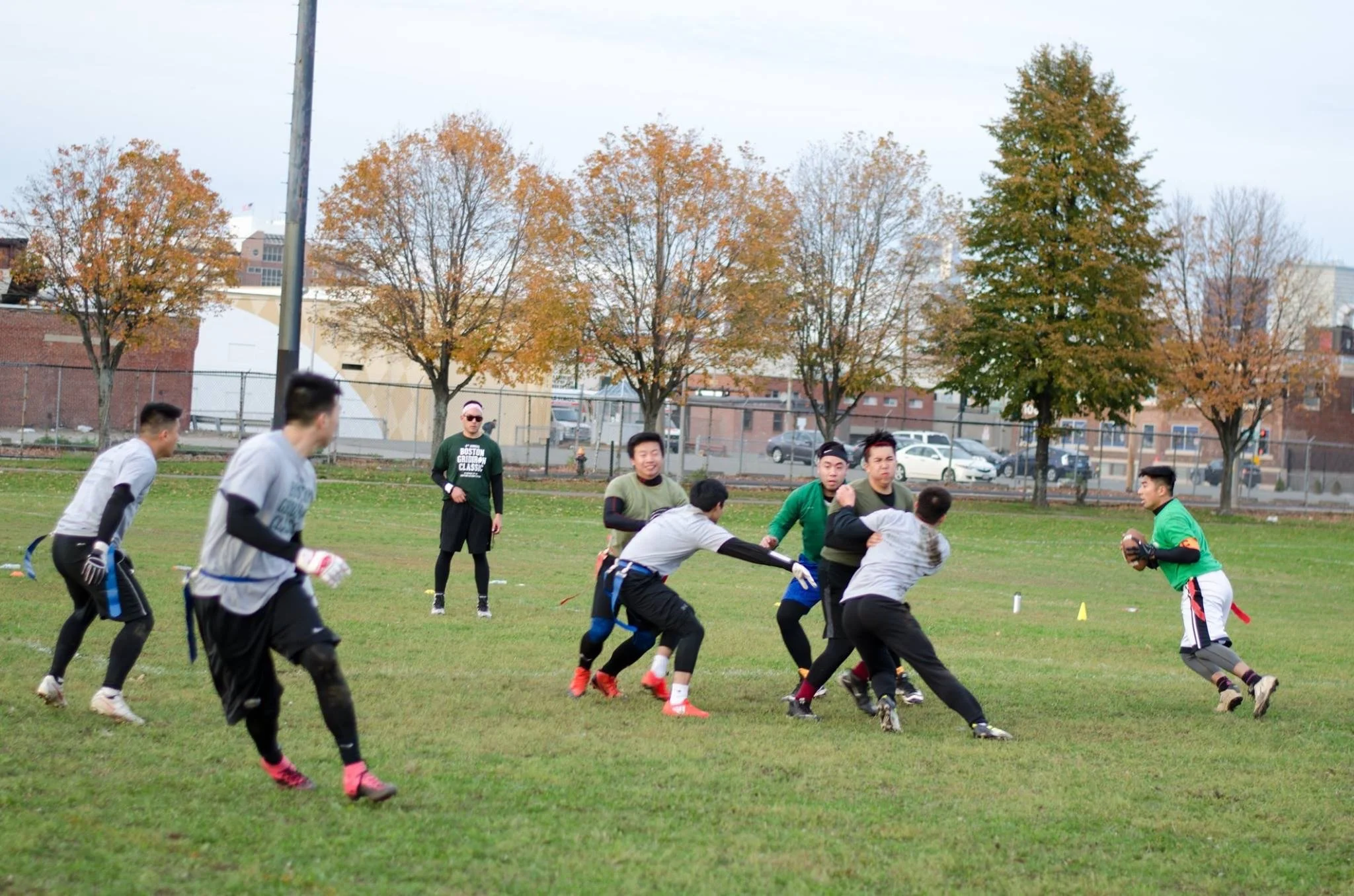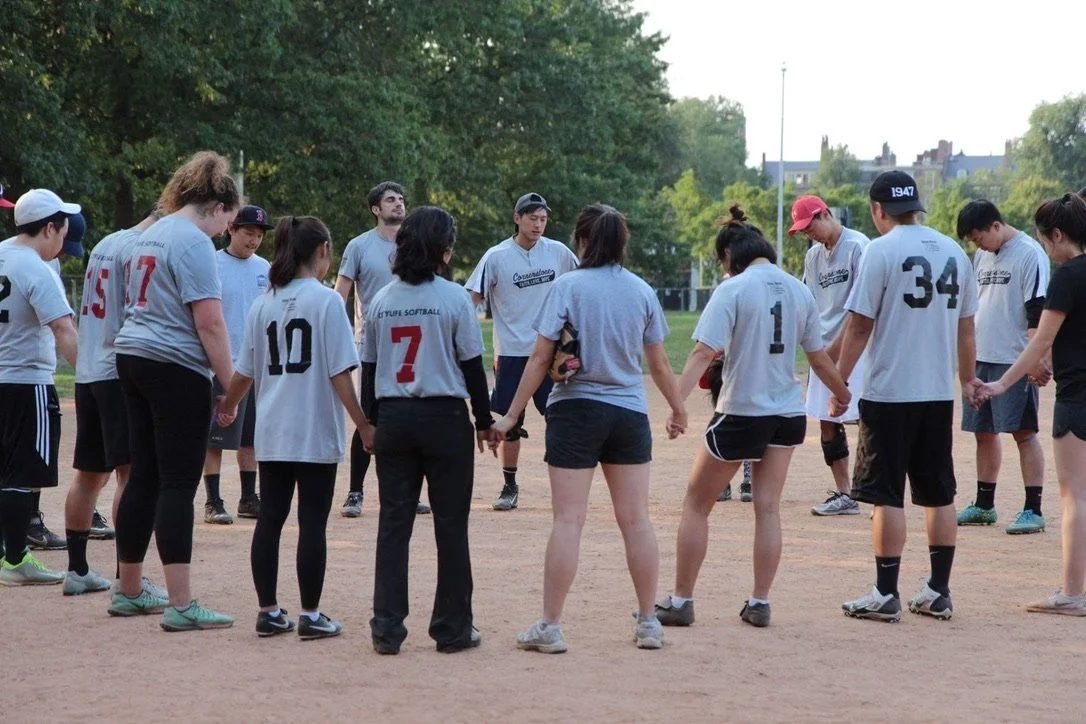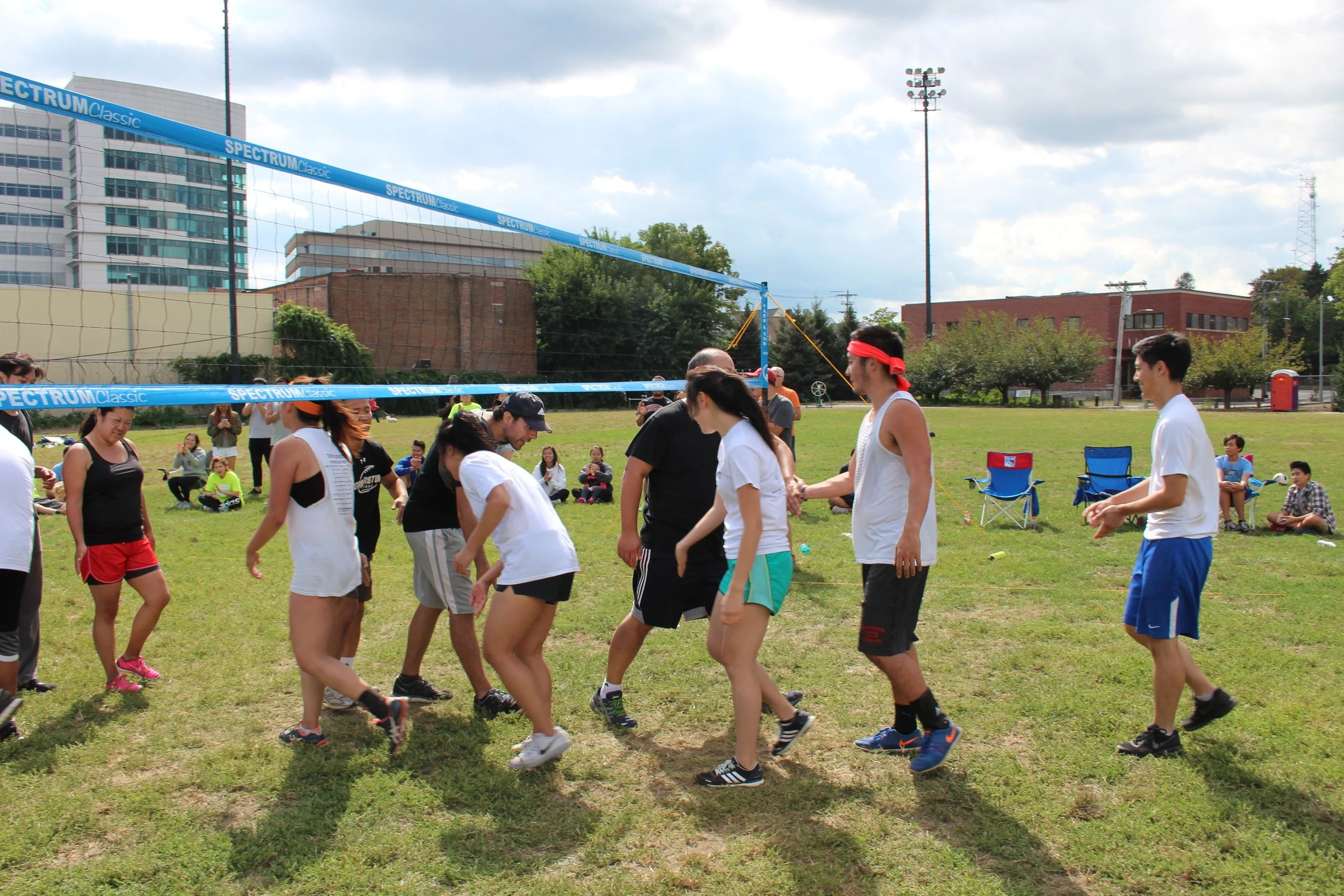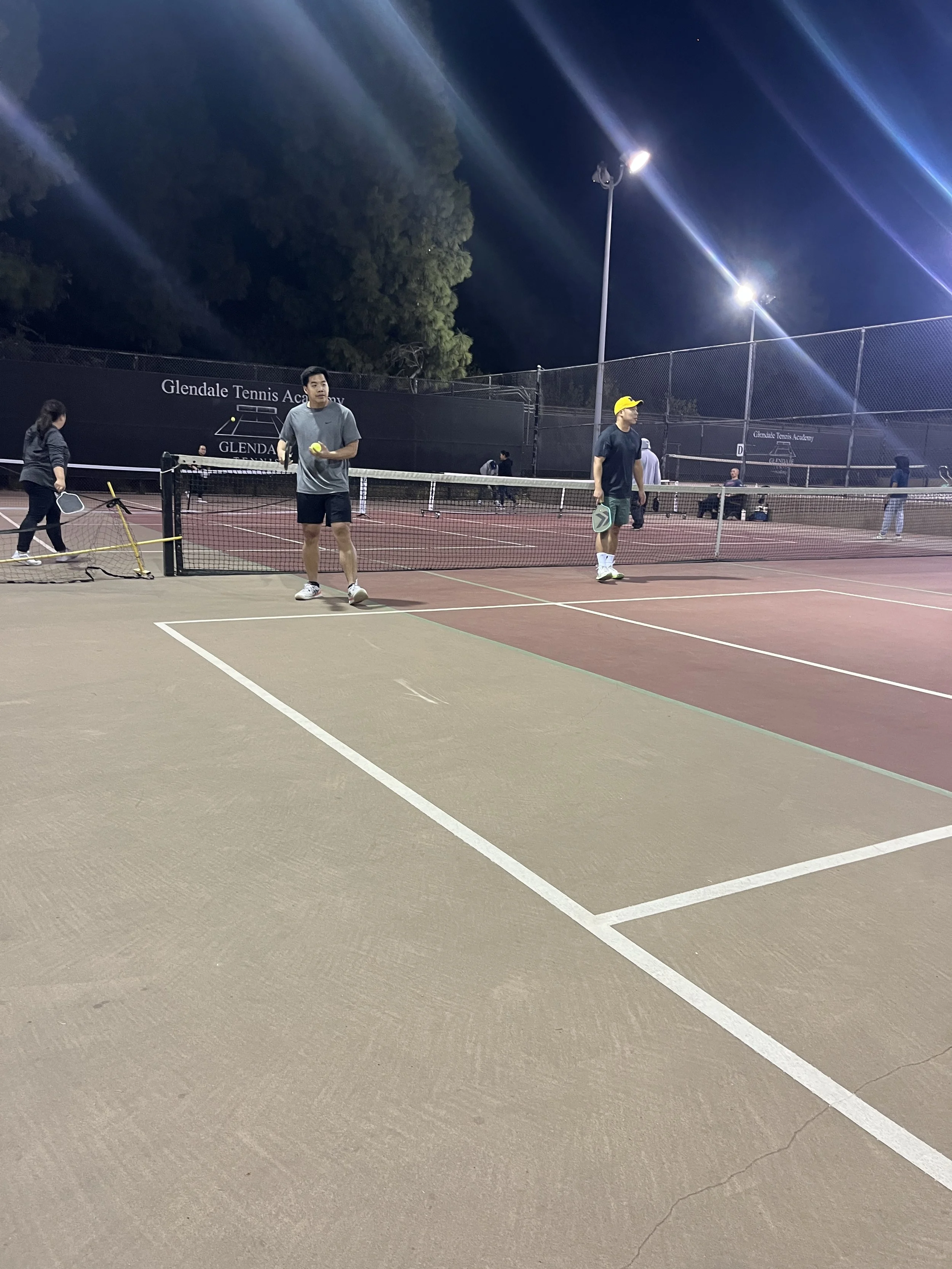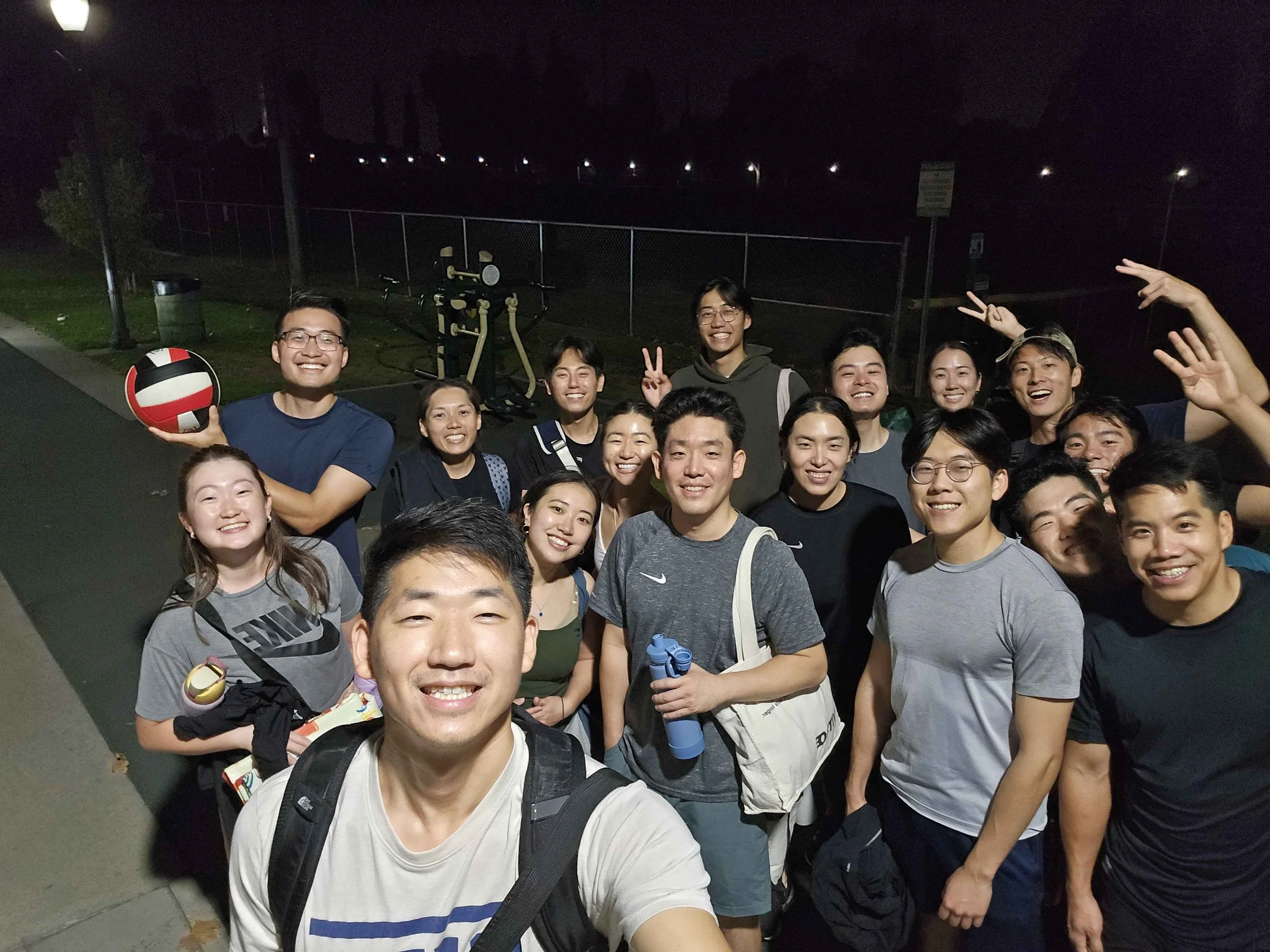Offensive Mindset within Sports Ministry Conversations
On a personal level, I enjoy playing most sports. Some of these sports include volleyball, flag football, softball, basketball, pickleball, soccer, golf...the list goes on. And if you ask people who know me well, I can also be extremely competitive. Therefore, I’m starting this blog post with a confession that part of my passion for a healthy, Christ-centric sports culture comes from a history of hurting myself or terrorizing others through my own hyper-competitiveness, and that I’ve wanted to create environments that protect myself and others, or others from my excessively competitive self... On the other hand, because of the immense joys and blessings I have also experienced through sports, including moments of reconciliation or loving accountability, I believe so much in the power of sports as a restored and holy form of play.
As someone who has had the privilege to steward sports in a church or ministry context, I have started to gravitate most towards volleyball and softball (maybe less so) because they have felt easier to align with building Christ-centered community in the ways they feel more team-oriented, physically safe, and inclusive related to age, gender, life stage, skill level, etc. compared to some of the other sports listed above such as basketball or football. These choices are probably influenced by the fact that other sports mentioned easily awaken my destructively competitive side, and I also recognize that each ministry context would be different depending on the demographic, etc. However, when having conversations about why I gravitate towards volleyball, especially with leaders in churches who also like to organize sports, I think the focus usually turns towards preferences of one sport over another since each individual would prefer to lead a sport that he or she is best at or enjoys the most (understandable). However, I think these conversations have revealed my own yearning for deeper and more nuanced conversations about leading sports ministries rooted in common language that inspire creative, sacrificial, and collaborative ways of discerning and facilitating sports in ways that focus on maximizing spiritual aims without compromising the ways sports help fulfill our personal needs too, such as my need for occasional intense competition.
Something that comes to mind is a Citizens Church sermon preached on Ephesians 6:10-20 on the Armor of God back in November 2024. Pastor Jason referenced Pete Scazzero’s perspective on how our society has reduced good marriages to simply staying faithful to spouses. In this way, our contemporary culture has set low standards for marriage rather than adopting an offensive mindset in ‘actively seeking love,’ similar to how many Christians think about life in terms of simply trying not to sin versus proactively pursuing a rich life in Jesus Christ so that we can experience maximized joy, freedom, celebration, and blessing for ourselves and others. I have always felt inspired by this offensive mindset, thinking about how to ‘maximize’ what is spiritually beneficial rather than simply trying to ‘prevent’ the negative. In the realm of sports ministry, I feel like conversations can also easily be reduced to how sports can be harmful and how to prevent those consequences. While I believe that defensive position is important and valid, I am curious if there was a way to also include more offensive postures in actively striving toward what is spiritually beneficial for a church community and how sports has already or can potentially contribute to that?
Thus, below are just a couple principles and frameworks I encountered in my research where I am wrestling through my own exploration of what it means to navigate and steward sports in a biblically-rooted manner that is spiritually beneficial for the church and/or local communities. In addition to stewardship principles applied toward discerning specific sports, I included a couple other tensions in sports ministry broken down by thematic categories per below:
Theme 1: Eyes on the Prize - Joys of Sports Ministry Leading the Conversation
As mentioned in a previous post, sports are not immune to sinful corruption and abuse in ways that go against the holy design of play. Harvey (2014) explains how sport in society has historically taken on many forms and expressions, and in many ways were used as a vehicle for pageantry, idolatry, and cruelty that does not honor God and conflicts with Christ-centered values. Treat adds, “sin shapes sport culture in a variety of systemic ways, such as the win-at-all-costs mentality that leaves in its wake broken families, compromised integrity, and wounded friendships” (n.d., p. 5). Thus, while sports can be a holy and healthy expression of humans delighting in God and His creation, they can also mirror sinful human nature, much like how my own excessive competitiveness has led to injuring others or damaging relationships. Furthermore, like other good things meant for us to enjoy, the power and influence of sports in our lives are at risk of causing distraction, idolatry, harm, and destruction. However, I believe the more tragic loss is when unhealthy stewardship or engagement causes ourselves or others to miss out on the abundance of joy, hope, connection, healing, recharge, and freedom that can be received through the gift of holy play. Could integrating conversations about what joys we would miss out on inspire a more collaborative and creative posture towards navigating sports ministry rather than maintaining focus on all the ways sports can gone wrong?
Theme 2: Sacrificial Discernment & Stewardship of Competitive Sports in a Spirit of Love
Throughout history, there have been long-standing debates about whether faith and competitive sport are compatible as the Church wrestled these questions for centuries (Harvey, 2014). In today’s modern day context, I believe there are still doubts regarding the compatibility of faith and sport but also some uncertainty around choosing specific types of sports that align with values of the church. For instance, I have witnessed many church-sponsored basketball or football games where players would end up fighting one another and creating a hostile environment modeling anything but Christ-like behavior. Thus, as mentioned in the intro above, do competitive sports belong in the realm of ministry and does it matter which type of sport is chosen?
As a response to some of these questions, Lewis et al. (2024) provide a framework of six biblical principles that inform spiritual and ethical approaches toward participation and facilitation of sports that could help leaders in the practice of sports ministry. The Mastery principle considers, “can I participate in this sport, continuing to be the person I know myself to be in Christ, or does my participation cause me to think and act contrary to biblical teaching and how I would normally think or act?” (Lewis et al., 2024, p. 86). On the other hand, the Temple principle asks, “am I honoring and serving God with my body” while the Benefit principle discerns whether “sporting involvement is beneficial or constructive for me and the lives of people around me” (Lewis et al., 2024, p. 86). Subsequently, the Glory principle examines whether participation in sports either gives or takes away glory from God while the Fruit principle asks if the fruit of the Spirit (love, joy, peace, forbearance, etc.) is being displayed or if the fruit is being undermined because of participation (Lewis et al., 2024, p. 86-87). Lastly, the Love principle addresses the important question: “am I successfully carrying out the greatest commandment to love God and love others in my sporting activities?” (Lewis et al., 2024, p. 87).
Lewis, D., Irby, D., Galipault, W., & Rasmussen, W. (2024). Sports ministry. Human Kinetics.
Per the chart above, two added dimensions include the team/individual elements of the sport and the physical nature of the activity. Sports such as hockey, football, and basketball that include heavy amounts full-contact among opponents may increase a likelihood that competitors will harm one another (Lewis et al., 2024). On the other hand, team-oriented sports with less contact such as volleyball or badminton may encourage a greater sense of cooperation and camaraderie. While Scripture does not specifically articulate how to choose or facilitate specific sports, I believe these biblically-rooted principles of Christ’ love, glory, spiritual fruit, stewardship, etc. along with practical considerations such as contact/non-contact provide some type of framework toward prayerfully making decisions about which specific sports might be most effective at pointing others toward Christ or other shared goals, visions, or purposes that are agreed upon. I am curious as to what other frameworks may be relevant or could be applied as it relates to this conversation…
Theme 3: Discerning ‘Successful’ Sports Ministry Strategies
Weeknight volleyball gathering at Almansor Park through ‘Friends of Citizens’ Community
What is the appropriate balance between operating sports formally as a ministry without diluting the authenticity and freedom of more spontaneous and organic forms of play? What are the benefits and challenges in formalizing a sports ministry and could it be facilitated in a way that supports and encourages a wider, flourishing culture of sports within the church? Criticism toward formal sports ministries usually focus on the fact that the certain structures or expectations may overly promote, promise, or emphasize ‘benefits’ of sports in a way that ironically prevents participants from authentically experiencing the true gifts of sport that are often received unexpectedly through more spontaneous and organic forms of play. On the other hand, while formal sports ministries may be criticized as being too rigid or agenda-driven with objectives, the corresponding structures, expectations, and resources may create opportunities for more marginalized people groups to participate in the ministry or activity, broadening an organization’s capacity to accommodate a wider range of participants who are typically excluded from more organic forms of play.
These questions are particularly relevant in our current ministry context at Citizens Church where the leadership is examining the dilemma of whether to establish an official sports ministry or let it continue as an informal ‘partner’ of the church. The current informal model could be loosely characterized as consisting of personal group chats that allow friends to play sports with one another, along with a more inclusive and open channel in the Discord app called “Friends of Citizens” that almost anyone can join through word of mouth. Some examples of channels found in Discord include basketball, racket sports, soccer, volleyball and other activities such as rock climbing. However, even though the Discord also posts church-wide announcements and information, it is not officially recognized or regularly monitored by the church nor is it restricted to Citizens members, creating some ambiguity as to how the channels should be facilitated and stewarded for the church’s ministry purposes.
‘Friends of Citizens’ Discord
Case for Less Formal Sports Ministry Approach
On one hand, this less formal model seems highly effective at supporting more organic gatherings of people both in/outside Citizens church that supports authentic relationship building, communal outreach, sabbath, evangelism, fellowship, and even healthy inter-church relations. In addition, it has also become a way for some people to access a structure of community outside the formal community group structure provided by the church. For myself personally, I have benefited immensely from being part of the ‘Friends of Citizens Volleyball’ group in the ways it has helped me grow spiritual friendships, feel welcomed into the church and LA, and enjoy God’s creation with others in the context of sabbath and play. And even though I am newer to the church, I have already been able to share back this Christ-centered hospitality I received toward many newcomers who show up at our volleyball outings. Lastly, the informal approach places less demand on the church’s resources and staff while building a foundation that supports occasional church-wide participation through events such as formally announced pickleball tournaments or all-church picnics that include volleyball and soccer. While this reflection only captures my limited perspective and experiences, I have heard similar stories from others about the ways the unofficial Citizens sports community has served them well.
Case for More Formal Sports Ministry Approach
On the other hand, I believe some of the growing challenges/tensions of the informal sports ministry approach that I perceive or hear from others include limited resources, accountability, accessibility, unified leadership, and spiritual/administrative support that enables a long-term, sustainable, and fruitful rhythm of sports environments that align with the vision and values of Citizens Church. For instance, there are many members of the church who are not accessing the benefits of these informal gatherings since it is not shared or announced through the church’s official communication channels such as announcements, emails, or social media. And while more organic forms of play sound ideal, they can also unintentionally exclude those limited in resources, skills, or sociability. On a different note, many unofficial leaders who have volunteered to help facilitate or organize these informal sports outings through Discord have found themselves exhausted or burnt out trying to meet unrealistic expectations of Citizens and non-Citizens participants who place pressure on leaders to organize gatherings on a weekly/annual basis and also maintain the tricky balance of competitive/casual cultures that accommodates varied skill levels. However, when attempting to respond by resetting expectations or recruiting more volunteers to help with the demand, it can be difficult for leaders to establish a sustainable system without the presence of the church’s official support, financial resources, or a unified vision that guides leaders and participants in accountability toward shared expectations and goals in the ways that formal church ministries are established. A more official and structured sports ministry could be equipped to respond well to some of these challenges that can overwhelm a less formal and uninvolved approach by the church.
Ongoing Conversation: Space for All Types of Play
Overall, reflecting on my own experiences, I see the benefits and challenges of more formal (e.g. sports ministry) and less formal (more organic) environments of play, and believe there is space for all types. However, I think the challenge is figuring out ways they can complement one another rather than work against one another, which is a tension I see often within the ‘competitive’ vs. ‘less competitive’ landscape. I think each type of play could be stewarded in healthy or harmful ways within the church but I have enjoyed sports most when I can participate with a community of people who have the desire to work through the joys and tensions with Christ-minded stewardship and creativity even if we never arrive at a perfect solution. As part of a final integrative project in my Outdoor Ministry program, I have the privilege to work with our leaders from Citizens Church to examine and assess whether there is a place for a formal sports ministry within the church and how it could be facilitated in ways that seek to align with the church’s vision and values. Taken further, I am curious to see how sports ministry could potentially be maximized to benefit the spiritual needs of the Citizens community and the larger missional context of Los Angeles as a city. As this is a layered and complex conversation, I would love to hear added perspectives from others regarding their experiences with the presence of sports and sports ministries within the church.
Please feel free to submit through the comments section below. Would love to hear other reflections on this topic!
References
Harvey, L. (2014). A brief theology of sport (First US edition.). Cascade Books.
Lewis, D., Irby, D., Galipault, W., & Rasmussen, W. (2024). Sports ministry. Human Kinetics.
